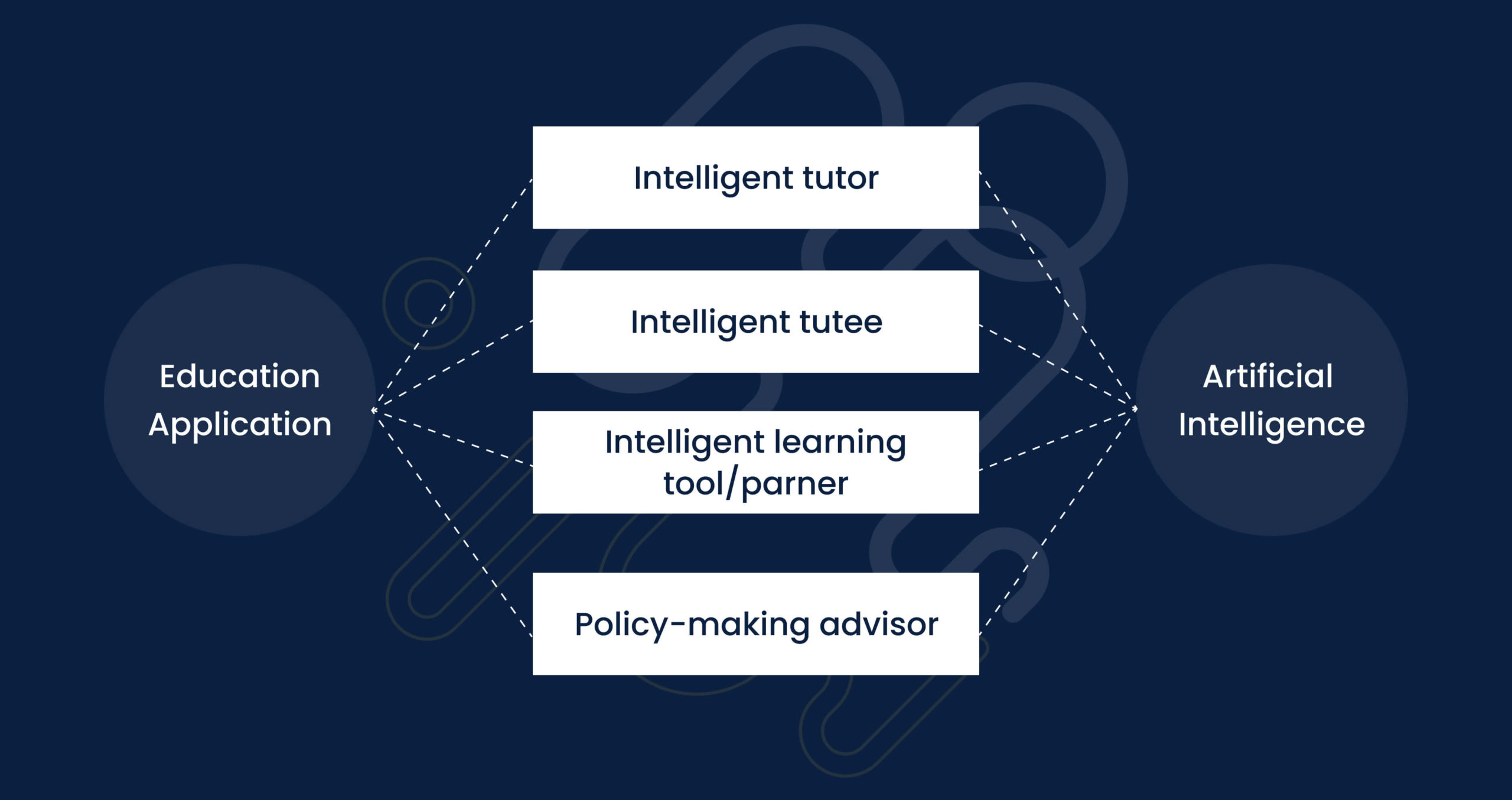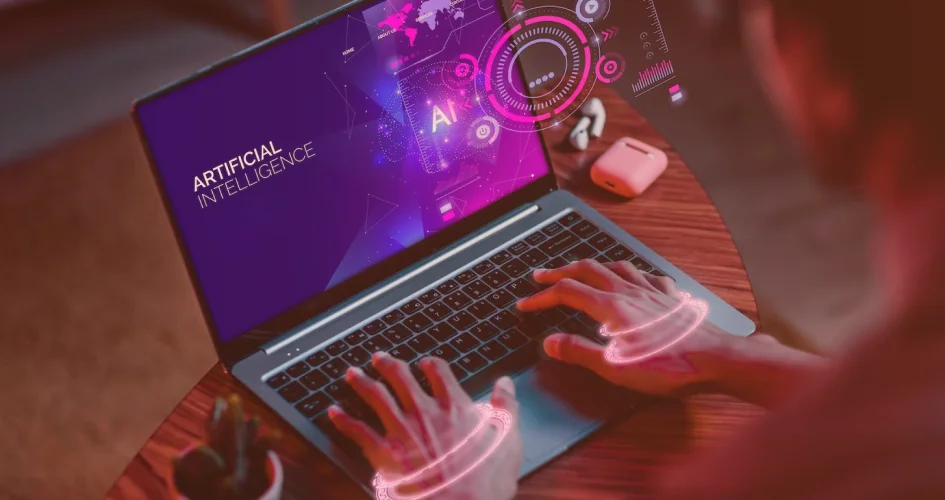Introduction
Do you know the remarkable ways AI has revolutionized the education industry?
Do you have an ed-tech startup or enterprise? If yes – you have landed at the correct place.
According to reports, by 2027, the AI education market is about to cross $20 billion.
Plus, the global e-learning market will grow by $166.60 billion by 2023.
Edtech businesses offer AI-generated courses to any age learner.
It gives you a personalized learning experience, figures out what you need to learn, and offers feedback with e-learning solutions.
AI development services build software and tools that merge and change the entire concept of learning throughout the industry.
This blog will be an excellent resource for startups, entrepreneurs, healthcare providers, and educational institutions looking to integrate into their operations for improved efficiency and innovation.
We will discuss the following points of AI in the education industry:
- What is the impact of AI in the education sector?
- Advantages of AI in Education
- Roles of AI in Education
- Uses of AI in Education
- Examples of using AI in Education
Let’s dive into the core of the article:
What is the impact of AI in the education sector?
Sal Khan, founder of Khan Academy, talking about AI in his TED talk show, stated that it is “the biggest positive transformation education has ever seen.”
AI education software has changed how we teach, with things like mobile courses, online references, and virtual classrooms replacing traditional methods.
Want to learn how AI is advancing Education? Read on!
- AI solutions inspect massive data sets using sophisticated algorithms.
- Second, it provides a personalized and adaptable learning experience.
- Conversational AI in Education, like chatbots and virtual tutors, helps an individual.
- AI chatbots use NLP (Natural Language Processing) and machine learning to help students.
- Besides, Generative AI provides knowledge base content rather than search and retrieve.
- Now, you know what AI in Education entails. Ahead, let us discuss the significant advantages of AI in Education.
Advantages of AI in Education
AI in Education has modernized various tasks. It has the potential to process data, suit individual needs, and automate tasks.
Besides, AI is changing the way students learn and educators teach. It has made the learning process hassle-free.
Let’s now look at the important AI in education examples, where technology is reforming learning and Education.
Personalized Learning
Every student adapts to knowledge in different ways; some grasp, while some take time.
The traditional learning methods missed the concept of customized learning for every student.
What’s new then? AI enables a personalized learning experience for every learner.
It can done by examining the learner’s performance. Either the curriculum or content fits according to their needs.
Machine Learning
Machine learning is a subset of artificial intelligence.
It is controlling education with data-driven insights. It predicts student outcomes and improves educational outcomes.
ML algorithms study the student’s past performance, learning style, and preferences. It creates curricula according to adaptability.
Further, it goes through entire educational content libraries.
It assists by suggesting textbooks and extra materials that align with a student’s current studies.
ML develops a tailored system for students who need more help.
It creates specific education plans and suggests teaching strategies based on learner’s needs.
AI-Embedded Educational Games
Games with AI in education are a creative way to delight students and make learning fun and effective.
These games use AI algorithms to assess a student’s strengths and weaknesses, learning style, and pace.
Next, these assessments help the games to tailor content and challenges to meet student’s requirements.
Besides, AI-based educational games offer instant feedback on student’s performance.
They receive feedback as they play and allows them to rectify their mistakes.
Hence, this rapid revert enhances the learning process and helps students learn from their behavior.
Further, there are games for every grade and age of learners, on any subject or topic. Suppose a learner is only 2 years old.
There are different games that help kids learn letters and bedtime stories that teach important life lessons.
Task Automation in Education
As AI is now used in school education and virtual classrooms, the technology is ready to take up most of the value-added tasks.
These tools and software align administrative, instructional, and assessment processes. It in turn minimizes the burden on educators.
AI tools for education can do things like check homework, grade tests, organize research papers, keep records, create presentations and notes, and help use resources.
Virtual Classroom Vulnerabilities
AI has maintained a positive impact on our environment by remote learning. AI-driven Education complements manual and virtual teachings.
Plus, it improves the teaching-learning process for individuals.
Smart Content Creation
AI and ML help teachers and researchers create upgraded content. It makes preaching and learning easy.
AI smart content creation makes online learning feel like a real-life, interactive experience.
Also, the 2D- 3D visualized content helps students to grasp complex concepts. It increases their understanding and retention.
AI allows for the creation of small, easy-to-digest learning content, which can store study materials and lessons.
The students and experts can use the entire material without any extra space in the system.
Besides, these materials are accessible from any device to make remote learning easy.
Improvising Examination Process
AI-based software and application solutions are upgrading examination in many ways.
AI programs track individuals through web cameras, microphones, and web searches. It performs a depth analysis, where any movement alerts the system.
Besides, it’s used in examinations and interviews. It detects suspicious behavior to alert the supervisor.
Plus, AI in examination offers features like automated grading, plagiarism detection, and adaptive testing.
Adaptive Testing
This method utilizes AI algorithms to adjust the level of questions based on student’s responses.
Instead of presenting students with the same questions, it works in real time.
The question gets harder, if correct and easier, if incorrect.
This adaptive process continues till the test has determined the student’s skill level and knowledge.
Adaptable Access
Adaptable accessibility ensures that AI technologies and tools create an inclusive learning experience for a wide range of students including those with special needs.
It promotes an environment where all learners, abled or disabled, take part in the education process.
The specially-abled students receive tailored resources and support as per their learning needs.
In this way, they get no barriers while learning, and students reach their full potential.
For instance, we have listed some applications of AI tools that provide services for adaptable accessible students.
They are text-to-speech and speech-to-text, transcription, screen reading, predictive text, and voice recognition.
Chatbots
AI in the education sector absorbs data from available resources to inform and provide guidance to learners through the increased use of Chatbots.
It benefits both professionals and tutors for user engagement in personalized learning.
AI chatbots solve enrollment queries, deliver instant solutions, and provide access to required study material 24*7.
Closing the Skill Gap
AI development services deliver a wide range of opportunities for students to upskill.
Also, it upskill the business workforce, boosts morale, increases the company’s commitment, improves and innovates.
Thus, AI in the education industry analyzes how people get skills and automates the learning process.
Customized Data-based Feedback
Feedback is an essential factor when it comes to crafting learning experiences. Yet, feedback must come from trusted sources.
Thus, AI in Education examines and determines work reports based on daily data.
Data-based feedback helps in student satisfaction, eradicates partial factors from learning, and understands where skills are lacking.
Then, the feedback tailors according to student and employee performance noted in the system.
The Role of AI in Education
There are many roles of AI in education from the perspective of educational application.
Further, there were many studies related to AIED reported by researchers.
Those studies are generally categorized as follows:
Intelligent Tutoring System
AI tutors can provide learners with personalized feedback and guidance to work with the entire curriculum.
These systems analyze learner’s performance and adapt the instructions they need.
Intelligent Tutee
An intelligent learner focuses on AI-based education systems where students become teachers to assist others.
It is a great way to boost students’ critical thinking skills and knowledge.
Yet, there are no specific studies that aim to create intelligent student tutors.
AI education systems learn from interaction with people. Hence, this learning ability in AI will help create intelligent student tutors in the future.
Intelligent Learning Tools or Partner
Intelligent learning tools help learners to collect and analyze data.
These tools enable them to concentrate on critical points or higher-order thinking than low-level tasks.
Such tools analyze and present data in a “smart” way that enhances deep learning.
It helps find valuable implications underlying the data.
For instance, a pedagogical agent in AI-driven education is a digital persona or partner to assist and interact with learners in an educational context.
These agents are computer-generated and take various forms, such as animated characters, avatars, and chatbots.
The primary purpose of pedagogical agents is to increase the learning experience by providing guidance, feedback, and support to students.
Finally, they engage the students through NLP which provides explanations and hints.
It even assesses understanding of subject matters.
Policy-Making Advisor
An advisor using AI for making policies in Education is generated.
It helps the people to make rules for getting a better understanding of what’s happening in Education.
They can see the big picture and small details through it.
Also, it makes better rules and checks on rules, if working well.
Uses of AI in Education
Artificial Intelligence is not only transforming the way students learn. Besides, it’s reshaping the roles of educators, parents, and administrators.
Here are some critical uses of AI in Education.
Instructional Assistants
AI-driven instructional help is changing the way teachers deliver lessons and support students.
These AI assistants help educators with many tasks.
It includes creating customized learning material, grading assignments, and real-time feedback.
The administrative chores are automated. Also, it gives teachers more time to customize instructions and mentoring.
Teaching Assistants
Auto tutors assist in enhancing the educational experience by giving more support to educators.
It automates routine tasks like drafting lesson plans, creating customized material, designing worksheets, developing quizzes, and researching ways to explain complex academic materials.
These AI assistants help educators with recommendations to meet students’ needs.
Also, it helps teachers reflect, plan, and improve their teaching practices.
Parent Assistants
AI help parents generate letters requesting individual education plan (IEP) services.
They can also ask for their child’s evaluation for a gifted and talented program.
If parents want to search for schools for their children, AI can serve as administrative help.
AI maps out school options within driving distance from home.
It helps generate application timelines, provide contact information, and more. Besides, a Generative AI-based app creates bedtime stories with plots that are in the child’s interest.
Administrator Assistants
School administration uses generative AI to draft various communications. It includes materials for parents, newsletters, and other community engagement documents.
Moreover, AI development services help create software to help with tasks like organizing class or bus schedules.
AI Real Examples in Education
AI applications in Education are changing students’ way of learning. It offers tailored requirements according to individual ability.
Let’s dig into a thorough explanation of how a few top global brands are merging AI and Education to create AI-based applications.
Google Classroom is a recognized AI tool to simplifies several phases of teaching. It allows teachers to design and assign tasks, give feedback, and control classroom interaction.
Google Classroom AI algorithm supports automated grading, generates individual recommendation learning material, and analyzes students’ data.
And, it helps to provide insights into the performance and growth of an individual.
Besides, Google Translate and Google Scholar are powerful tools that enhance students’ and educators’ learning and research experience.
The language barrier areas Google Translate provides instant text, websites, and spoken language translations.
Google Scholar uses AI algorithms to analyze and index intellectual articles, research papers, and academic resources.
It makes it easy for students, researchers, and educators to find relevant and authorized sources for studies.
Coursera
Coursera changes AI in Education by providing personalized recommendations, grasping learning paths, and automated assessments.
Other than that, the students can receive personalized suggestions and on-time reverts.
Besides, AI algorithms test user preferences and performance data to suggest appropriate courses.
It adjusts course content based on the learner’s progress and provides instant grading.
The AI-driven features improve engagement and outcomes in online Education.
Duolingo
Unlike any other educational app, Duolingo is a renowned language-learning app. It utilizes AI in developing flexible learning lessons.
The AI systems check student’s progress, spot areas for development, and change course content if necessary.
Further, the application provides students with lessons, vocabulary drills, and interactive tests.
It supports language learners as they enhance their skills. Next, it aids in efficient language learning, speech recognition, and pronunciation feedback.
Embrace AI-driven education with Intelivita
AI’s impact on the education sector is more profound than the thoughts of a person!
Many EdTech businesses are using AI to improve the learning experience of students.
Also, they use Chatbots and robotics to provide students with all-time support.
Besides, some use AI algorithms to identify struggling students and offer targeted courses.
If you want to improve your Edtech startup or business, opt for AI development services.
It’s a bright area to invest in that has a higher ROI in the future. Connect with our experts to know more!




